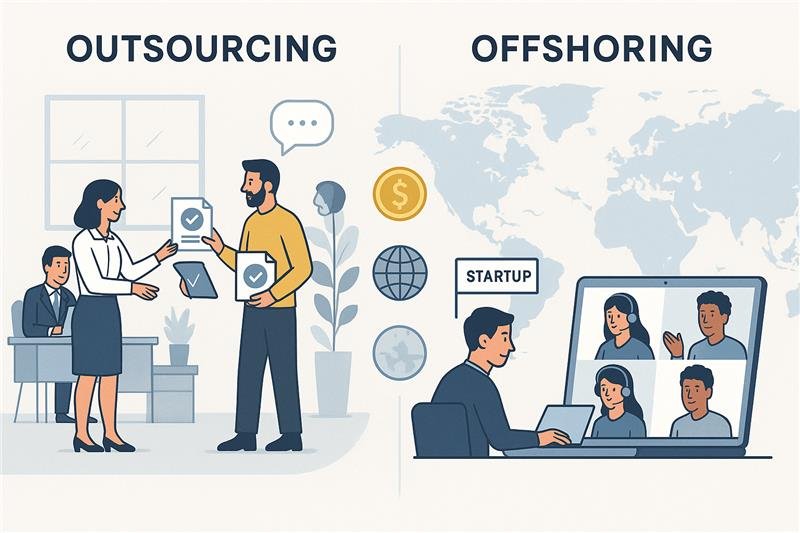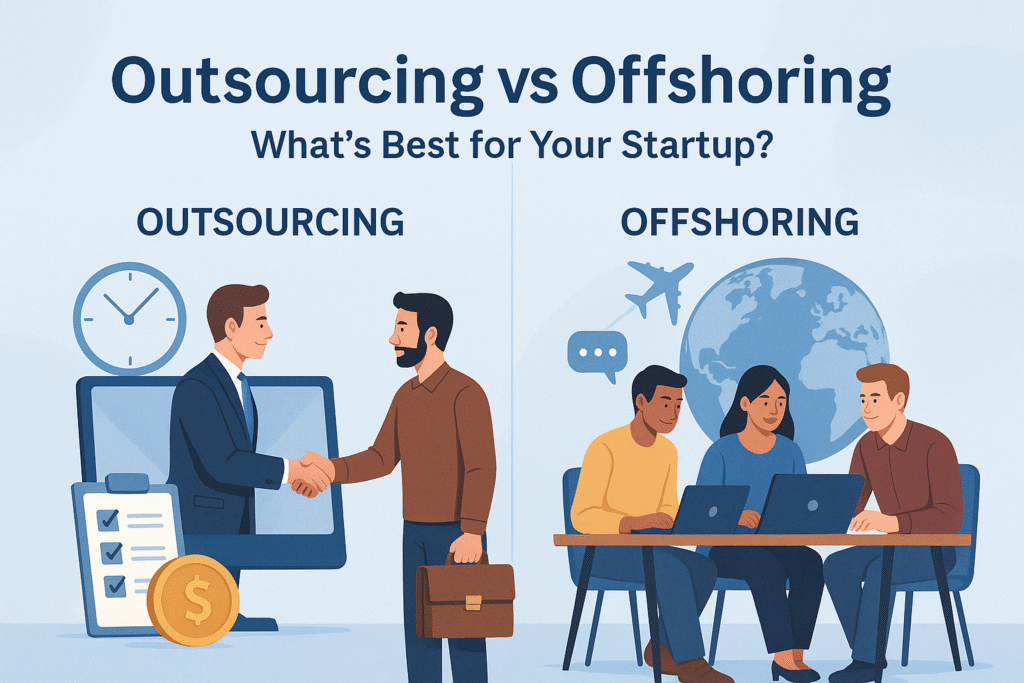In today’s hyper-competitive business environment, startups are under constant pressure to scale quickly, reduce operational costs, and deliver quality, all while managing limited resources. That’s why many founders explore global resource models such as outsourcing and offshoring.
Although often confused, the difference between outsourcing and offshoring is significant. Picking the wrong strategy can cause communication breakdowns, rising costs, or lost time. Whether you’re building an MVP, scaling a product, or expanding operations, understanding how these two models differ is crucial for long-term growth.
In this post, we’ll explain both concepts clearly, compare them side-by-side, and help you decide which one is the right fit for your startup.

What Is Outsourcing?
Outsourcing is the process of hiring an external third-party company or individual to manage specific tasks or services. It’s often used to increase efficiency, reduce costs, or access specialized skills without the commitment of hiring full-time employees.
In the startup ecosystem, outsourcing is a common approach for tasks such as product development, customer support, digital marketing, and technical services.
Benefits of Outsourcing
-
Reduced Costs: Pay only for what you need—no overhead or employee benefits.
-
Faster Time to Market: Lean teams can move quickly using experienced vendors.
-
Specialized Skills: Gain access to niche talent like React.js or DevOps experts.
-
Operational Flexibility: Scale up or down based on your project timeline.
Common Outsourced Services
-
App or web development
-
UI/UX design
-
SEO and content writing
-
Tech support or helpdesk
-
QA and bug testing
For example, many startups outsource their web development work in the early stages to get a high-quality product to market quickly. Learn more about our web development services crafted specifically for growing businesses.
Understanding this model is key before you evaluate the difference between outsourcing and offshoring in more complex scaling scenarios.
What Is Offshoring?
Offshoring involves relocating parts of your business operations—like software development, support, or finance, to a foreign country. Unlike outsourcing, which uses third-party vendors, offshoring typically means you retain more control, either by hiring offshore teams directly or through a dedicated partner.
Offshoring is commonly used for building long-term technical teams, establishing offshore development centers (ODCs), or managing round-the-clock operations in time zones that complement your business hours.
Benefits of Offshoring
-
Long-Term Cost Efficiency: Offshore teams are more affordable than domestic hires.
-
Team Continuity: Retain knowledge, culture, and workflows within your offshore team.
-
More Control: Set tools, processes, and day-to-day management practices.
-
Access to Large Talent Pools: Tap into highly skilled professionals in India, Ukraine, the Philippines, and more.
As your team grows, you’ll need to clearly understand the difference between outsourcing and offshoring so that you can structure your hiring and delivery strategies efficiently.
The Difference Between Outsourcing and Offshoring: Key Factors for Startups
Here’s a direct comparison to help you choose the right strategy:
| Factor | Outsourcing | Offshoring |
|---|---|---|
| Definition | Hiring third-party vendor | Relocating operations to another country |
| Control | Low to moderate | Moderate to high |
| Ownership | Vendor owns delivery | Startup owns process or contracts a partner |
| Time Zone Alignment | Varies by vendor | Often in different time zones |
| Use Case | Short-term or specialized work | Long-term scalable operations |
| Team Integration | Separate from internal team | Integrated like an in-house team |
| Speed to Start | Quick setup | Slightly longer onboarding |
As highlighted in ValueCoders’ article, both approaches serve different purposes. Outsourcing is ideal when you need speed and flexibility. Offshoring is better when you’re thinking long-term and want more control.
Why Understanding the Difference Between Outsourcing and Offshoring Matters
The difference between outsourcing and offshoring isn’t just a technical one—it’s a strategic choice. Picking the right model helps you:
-
Optimize costs
-
Maintain quality
-
Avoid communication delays
-
Ensure scalability without disruption
Startups that understand this difference early on tend to grow faster, delegate smarter, and focus better on their core product.
Many companies even use both models together, starting with outsourcing to launch quickly, then shifting to offshoring as they build a more stable team overseas.
According to Unity Connect, offshoring provides greater control, consistency, and scalability, especially for startups expanding globally.
Real-World Use Cases
Outsourcing Examples
-
A startup outsources UI/UX design to a design agency.
-
A SaaS company outsources backend API development.
-
An eCommerce brand hires a third-party vendor for order fulfillment.
Offshoring Examples
-
A startup hires a remote React.js team in India.
-
An IT company builds a dedicated offshore development center.
-
A fintech firm moves accounting and customer support to the Philippines.
Supply chain and logistics companies also adopt supply chain outsourcing to offshore their warehouse, shipping, or tracking functions.

Which Model Should You Choose?
Here’s a quick guide:
Choose Outsourcing If:
-
You need short-term, specific expertise
-
You want to launch your MVP quickly
-
You’re not ready to manage a full team
Choose Offshoring If:
-
You’re scaling for the long term
-
You want a stable, integrated offshore team
-
You have processes in place and want cost savings
Startups that clearly understand the difference between outsourcing and offshoring avoid confusion, prevent rework, and save money.
How Rsquare Technologies Can Help
At Rsquare Technologies, we support startups with both outsourcing and offshoring models. Whether you want a one-time project delivery or a long-term offshore team, we provide startup-friendly solutions tailored to your goals.
You can hire full-stack developers to support product development or explore our custom software development services to build secure, scalable apps and platforms.
Our expertise spans across:
-
PHP, React.js, Node.js, Laravel
-
Mobile app development
-
DevOps and cloud engineering
-
Long-term offshore resource planning
Conclusion
Startups often hear the terms outsourcing and offshoring, but few understand how different they really are. Knowing the difference between outsourcing and offshoring helps you pick the right model based on cost, speed, control, and scalability.
Use outsourcing to stay lean and launch fast. Move to offshoring when you need team stability and long-term resource control. Both paths can lead to success, as long as your decision aligns with your startup’s stage and growth strategy.
With Rsquare Technologies as your technology partner, you’re never making the decision alone.



